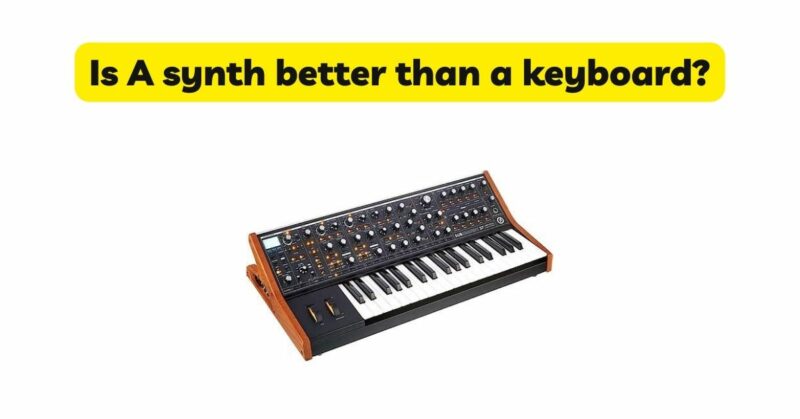The world of music is teeming with diverse instruments, each with its own unique qualities and capabilities. When it comes to electronic music, the debate between using a synthesizer or a keyboard can be a contentious one. Both instruments offer distinct features and advantages, making it challenging to definitively declare one as superior to the other. In this article, we will explore the characteristics, functionality, sound possibilities, control options, and intended uses of synthesizers and keyboards. By examining these factors, we aim to shed light on the question of whether a synth is better than a keyboard, providing insights for musicians seeking the perfect instrument for their creative journey.
- Sound Flexibility and Versatility: One of the key considerations when comparing synthesizers and keyboards is the sound flexibility and versatility they offer. Synthesizers, true to their name, specialize in creating and manipulating sounds through electronic signal processing. They provide an immense range of sonic possibilities, allowing musicians to sculpt unique and custom sounds that go beyond traditional instrument emulation. With oscillators, filters, envelopes, and modulation sources, synthesizers unlock the potential for sonic exploration, making them ideal for genres like electronic music, sound design, and experimental genres.
On the other hand, keyboards typically aim to replicate the sounds of traditional acoustic instruments, such as pianos, organs, and orchestral instruments. They excel at reproducing realistic instrument sounds and offer a broad selection of preset sounds to choose from. Keyboards are well-suited for a wide range of musical genres, including classical, jazz, pop, and rock, where the authentic replication of traditional instruments is desired.
- Control Options and Sound Manipulation: Control options and sound manipulation capabilities are crucial factors in assessing whether a synth is better than a keyboard. Synthesizers often provide an extensive array of control elements, such as knobs, sliders, buttons, touch-sensitive surfaces, and modulation sources. These controls enable real-time manipulation and modulation of sound parameters, offering fine-grained control over every sonic aspect. This level of flexibility and customization appeals to electronic music producers, sound designers, and experimental musicians who desire complete control over their sound creation.
In contrast, keyboards generally prioritize playability and performance-oriented controls. They feature piano-style keys, pitch bend wheels, modulation wheels, and sustain pedals, emphasizing ease of use and familiarity. While keyboards may not offer the same depth of sound manipulation as synthesizers, they excel in live performances, studio recordings, and educational settings, where the focus is on faithfully reproducing traditional instrument sounds.
- Intended Use and Musical Genres: The intended use and the desired musical genre play a significant role in determining whether a synth or a keyboard is better suited for a musician. Synthesizers are especially favored in electronic music genres, such as EDM, techno, ambient, and experimental genres. They empower musicians to create unique sonic landscapes, generate complex textures, and craft sounds that go beyond the boundaries of traditional instruments. Synthesizers are also popular in film scoring and sound design, where versatility and sound manipulation capabilities are paramount.
Keyboards, with their ability to accurately reproduce the sounds of traditional instruments, find a home in a wide variety of musical genres. They are well-suited for classical, jazz, pop, and rock music, where pianos, organs, and orchestral sounds are prominent. Keyboards offer a familiar playing experience and serve as versatile instruments for solo performances, accompaniment, and ensemble playing.
- Portability and Form Factor: Portability and form factor considerations can significantly influence the choice between a synthesizer and a keyboard. Keyboards, particularly portable and stage pianos, are designed with mobility in mind. They are lightweight, compact, and easily transportable, making them suitable for musicians who perform in different venues or require on-the-go portability. Portability is often a key factor for gigging musicians, touring artists, and those seeking flexibility in their musical endeavors.
Synthesizers, on the other hand, come in a variety of sizes and form factors. While some synthesizers are designed to be portable and offer compact solutions, others prioritize functionality and sound capabilities over portability. Larger synthesizers with full-sized keyboards and more extensive control options are often preferred for studio use or fixed setups. Musicians who prioritize sound creation and manipulation over portability might opt for a larger synthesizer to enhance their studio production or sound design capabilities.
- Cost Considerations: Cost is another factor to contemplate when comparing synthesizers and keyboards. Keyboards, particularly entry-level models, tend to be more affordable, making them accessible to a broad range of musicians, including beginners. Higher-end professional keyboards can be more expensive, especially when they feature advanced features, premium sound libraries, and high-quality construction.
Synthesizers, on the other hand, can vary significantly in price based on their complexity, features, and sound generation capabilities. While there are affordable synthesizer options available, many professional-grade synthesizers with extensive control options and advanced synthesis techniques can be more expensive. The cost of synthesizers often reflects the depth of sound manipulation and customization they offer.
Conclusion: The question of whether a synth is better than a keyboard does not lend itself to a definitive answer. The choice between the two ultimately hinges on personal preferences, musical goals, intended use, and desired sound possibilities. Synthesizers excel in providing extensive sound manipulation and sonic exploration capabilities, making them highly suited for electronic music genres and sound design. Keyboards, on the other hand, offer versatility, authentic instrument replication, and playability, making them ideal for various musical genres and performance settings.
Ultimately, the decision between a synthesizer and a keyboard is subjective and dependent on the individual musician’s needs, preferences, and creative aspirations. Consider factors such as the desired sound versatility, control options, intended musical genres, portability requirements, and budget constraints. Both synthesizers and keyboards have their own unique strengths and purposes, and the “better” instrument for you will depend on the specific musical path you wish to pursue. Embrace your artistic vision and choose the instrument that resonates with you, allowing you to express your musical ideas and bring your creative vision to life.


